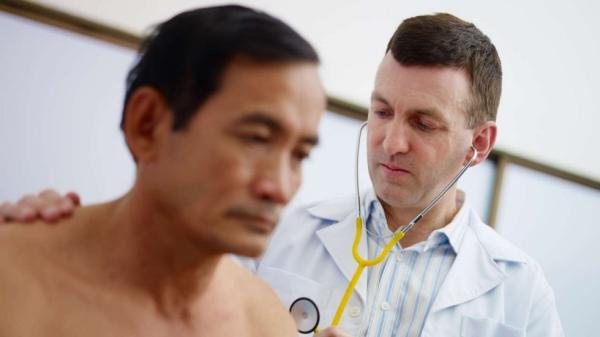China is gigantic, in nearly every sense of the word. And that certainly pertains to public health issues, as well.
From its massive population, to trade and finance, to its political significance – especially in light of President Xi Jinping’s elevation this week to Mao-like standing, making him the country's most powerful leader in decades – the Far Eastern behemoth evokes a looming, global presence.
And now we're learning, according to the results of a new and startling study released Wednesday by Yale University researchers, that China may have a gigantic, looming health crisis on its hands. It was determined that more than 1 in 3 Chinese adults have high blood pressure – with 95 percent not receiving the proper treatment or medication for the condition.
With China's adult population estimated at more than 1.1 billion (excluding 300 million children under 18), this would mean its current at-risk population for unchecked hypertension is roughly 350 million people.
That's compared to only 18 million affected adults who are effectively managing their condition.
"The small number of people in China who have this disease under control, even among those who receive medication, is quite alarming," said Dr. Harlan Krumholz, co-author of the study and director of Yale Center for Outcomes Research and Evaluation.
Working in tandem with the Chinese National Center for Cardiovascular Disease, this team of researchers conducted the "largest study of hypertension in China ever, involving 1.7 million people between the ages of 35 and 75 in all 31 provinces in mainland China, and 3,362 primary health centers," according to a Yale statement. The study was published yesterday in the Lancet.
 Stroke is responsible for 20 percent of all deaths in China annually, and uncontrolled hypertension is a primary risk factor. In addition, the nation has a rapidly growing population of older adults, and with the one-child policy that has been in place since 1979 (only repealed early last year) China is experiencing an acute shortage of working-age citizens that could potentially worsen significantly if this problem is not adequately addressed.
Stroke is responsible for 20 percent of all deaths in China annually, and uncontrolled hypertension is a primary risk factor. In addition, the nation has a rapidly growing population of older adults, and with the one-child policy that has been in place since 1979 (only repealed early last year) China is experiencing an acute shortage of working-age citizens that could potentially worsen significantly if this problem is not adequately addressed.
In a separate joint study conducted by Yale and the Chinese researchers, they found that only 37 percent of primary health centers in China carried the four needed classes of medication to treat high blood pressure. If there was any favorable news to come from this study, 11 in 12 pharmacies on average stocked some type of medication.
China, long considered the most populous nation on earth, has between 1.3 and 1.4 billion citizens, but that's recently been in dispute given India's recent explosive growth. Recent figures peg China's population at at 1,376,049,000, a figure which includes roughly 1,074,000,000 adults.
Referring to those who are actively treating their hypertension, the authors say that the "low number of people in control is ubiquitous in all subgroups of the Chinese population and warrants broad-based, global strategy, such as greater efforts in prevention, as well as better screening and more effective and affordable treatment."




